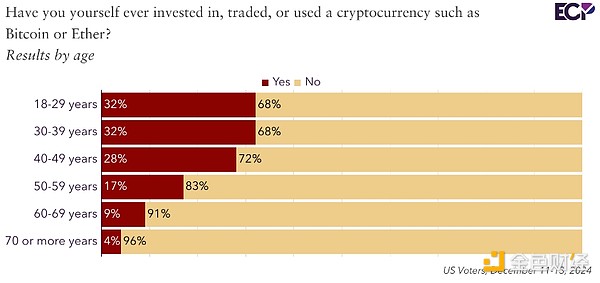
Source: Emerson College; Compiled by: Whitewater, Golden Finance
A new national survey from Emerson College finds that approximately one in five voters (19%) has invested in, traded or used crypto currency, while 81% of voters have none. Among voters who have used cryptocurrencies, 61% have not used cryptocurrencies for any purchases, while 39% have.
Spencer Kimball, executive director of the Emerson College Poll, said: “Cryptocurrency users are younger and minority groups are larger, highlighting the importance of cryptocurrencies as a growing, Diverse Constituency: 57% of Cryptocurrency Users Have a Favorable View of Donald Trump ” “Nearly one-third of voters under 40 have used cryptocurrencies, with the proportion declining as age increases, 40. 28% of voters over the age of 50 and 28% of voters in their 50s have 17% of voters in their 60s and 9% of voters in their 70s are cryptocurrency users. ”
Men are twice as likely as women to use cryptocurrencies: 26%. of men use cryptocurrencies, compared to 13% of women.
Cryptocurrency users are also more likely to be from minority groups: About one-third of Asian, Hispanic or Black voters are involved in cryptocurrency, compared with 14% of white voters.
TariffsRegarding the imposition of additional tariffs on Canada, Mexico and the United States, a majority of voters believe that such tariffs will harm the U.S. economy: 51% believe that additional tariffs on Canada will harm the United States Economically, 50% believe that additional tariffs on Mexico will harm the U.S. economy, and 49% believe that additional tariffs on Mexico will harm the U.S. economy. 39% think tariffs on Canada will help the U.S. economy, 36% think tariffs on Mexico will help the U.S. economy, and 32% think tariffs on Canada will help the U.S. economy.
Kimball said: "Voter attitudes on tariffs are very different from voting preferences in 2024. Among Trump voters, 69% think tariffs will help the economy, and 17% disapprove, compared to 79% of Harris voters. "Tariffs will hurt the economy, 13% think they will be beneficial"
Should Biden's son be pardonedPresident Joe Biden's approval rating is 36%, with 54% disapproving. His approval rating mirrored his November numbers, while his disapproval rating rose 2%. Over the past month, President-elect Trump's approval rating has remained steady at 51%, while 45% have an unfavorable view of him.
Voters were asked whether they support or oppose President Biden pardoning his son Hunter. A majority (52%) oppose it, 28% support it, and 19% are unsure. Voters were also asked whether they would support President-elect TrumpGeneral amnesty for people related to the January 6 incident; 50% opposed, 34% supported, and 16% were neutral.
Assassination of Healthcare CEOA majority of voters (68%) believe the actions of UnitedHealth CEO Brian Thompson’s killer were unacceptable. 17% think this behavior is acceptable, while 16% are unsure.
"While 68% of voters overall reject the killer's actions, younger voters and Democrats are even more divided - 41% of voters ages 18-29 find the killer's actions acceptable (24% acceptable, 17% completely acceptable), while 40% found it unacceptable; 22% of Democrats found it acceptable, 59% People think this is unacceptable, compared with 12% of Republicans and 16% of independents, highlighting a shift in social attitudes among the youngest voters and within the party. ”
Men are more likely than women to think this behavior is acceptable: 19% of men think this behavior is acceptable, compared with 14% of women.
TikTok banA majority of American voters (40%) support a ban on TikTok starting on January 19, while 30% are opposed and 30% are unsure.
"Half of voters under 30 years old oppose a TikTok ban, and 34% support it," Kimball said. "Support for a ban generally increases with age, with some in the 60s The highest approval rating among voters, at 46%. ”
Early 2028 Candidate Favorability SurveyVoters were asked how much they felt about Emerson’s previous sentiment survey in November. Do you have a favorable impression of a public figure? Mark Cuban (35% like, 10% have never heard of it), Alexandria Ocasio-Cortez (29% like, 14% have never heard of it) and Pete Buttigieg ( 34% like, 15% have never heard of) the potential candidate among the highest-profile voters.
Among Democratic voters, Pete Buttigieg (57%), Alexandria Ocasio-Cortez (54%), Gavin Newsom (50%), Gretchen Whitmer (46%) and Mark Cuban (44%) are the top potential candidates.
"It's worth noting that while Cuban ranks fifth among Democrats, he leads by 33 percent among independents," Kimball said. "Meanwhile, AOC emerged as the most polarizing figure, with strong support from Democrats but equally strong opposition from Republicans."
Vice President-elect J.D. Vance's approval rating varied: 41% of people have a favorable opinion of the future vice president, while 41% have an unfavorable view of him. Future Efficiency co-head Elon Musk also has a mixed rating among voters: 43% have a favorable opinion of Musk, while 43% have a negative opinion of him.











